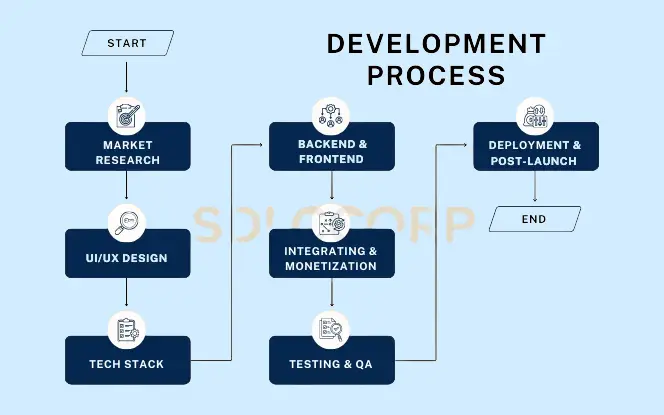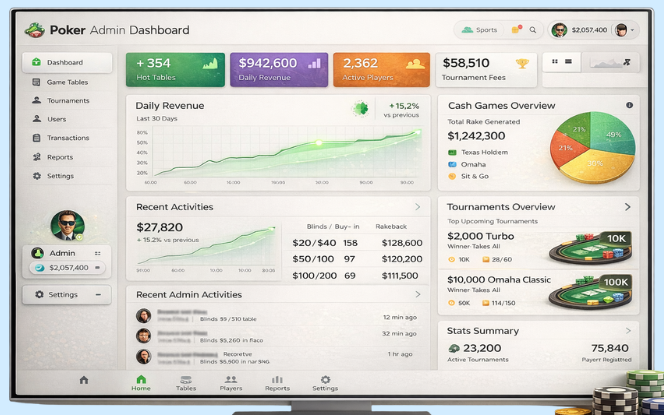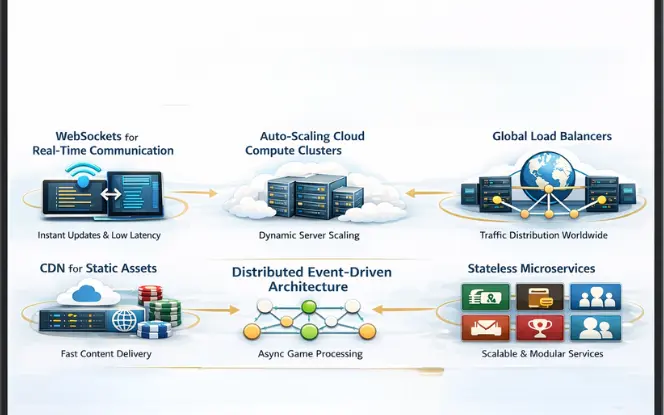Introduction
What Is the Poker Network and Why It Is Unique?

The Poker Network operates as a shared online poker ecosystem connecting multiple operators—often referred to as “skins”—to a central poker infrastructure. Instead of isolated poker apps competing separately, all operators contribute to shared player liquidity, increasing engagement and tournament participation.
A network like iPoker empowers operators to:
- Expand across regions without rebuilding core gameplay
- Support large MTT (multi-table tournaments)
- Reduce infrastructure and fraud risk
- Scale faster through shared services and backend logic
For additional insights into scalable gameplay architecture, see:
Step By Step Guide To Poker App Development Process
Development Process for Building an iPoker-Style Platform

Building an iPoker-like poker platform requires a strategic and regulation-ready development approach.
- Market & Regulatory Research
Analyze target regions, player demographics, and local gambling regulations to determine licensing and compliance requirements.
- Poker Network Architecture Planning
Design a scalable architecture that supports multiple poker rooms, shared liquidity, and real-time gameplay.
- UI/UX Design
Create intuitive poker tables, lobbies, and dashboards focused on smooth gameplay and fast player actions.
- Development & Integrations
Develop game servers, backend systems, and integrate payments, KYC, RNG, and real-time networking.
- Testing & Certification
Conduct gameplay testing, RNG audits, security testing, and high-load performance testing.
- Launch & Continuous Optimization
Deploy the platform, monitor player behavior, optimize matchmaking, and scale infrastructure as traffic grows.
If you want to launch faster, you can explore poker software for sale that is already licensed and ready to deploy.
Key Features Required in Poker Network App
Beyond network-level functionality, don’t ignore basics—these are the essential features of a poker game app that every poker platform should include.
1. Player Features

These features ensure secure onboarding, smooth gameplay, and personalized user experiences.
- Secure registration & MFA – enables protected user access using email, mobile OTP, or multi-factor authentication.
- KYC & age verification – verifies user identity and prevents underage or fraudulent accounts.
- Player profiles & VIP tiers – track achievements, loyalty progress, and personalized privileges.
- Multi-currency wallet (fiat + crypto optional) – supports flexible deposits, withdrawals, and currency conversions.
- Real-time payments – enable instant wallet transactions for seamless gameplay flow.
- Multi-table gameplay – allows players to join and switch between multiple poker tables.
- In-table communication – fosters engagement through emojis, chat, and reactions.
- Tournament lobby & schedules – displays available tournaments, timings, buy-ins, and ticketing details.
2.Game Feature Support

These capabilities ensure diverse gameplay formats and tournament experiences.
- Texas Hold’em mode – supports the most popular poker ruleset worldwide.
- Omaha gameplay variant – enables advanced gameplay for experienced players.
- Sit & Go tournaments – single-table events that start once all seats are filled.
- Scheduled tournaments marketplace – lists upcoming matches and time-based competitions.
- Side pots + rebuy logic – supports pot splitting and player rebuy features during tournaments.
- Tournament ticketing system – manages seat allocation, entries, and rewards.
These require real-time calculations, synchronized gameplay logic, and secure server-side rule enforcement.
3. Admin and Operator Controls

Enable centralized oversight, compliance enforcement, and game configuration.
- Player management dashboard – view, suspend, or manage player accounts and history.
- KYC approval workflows – verify user documentation and identity before deposits.
- Game & table configuration tools – adjust stakes, blind levels, seat limits, and table rules.
- Tournament scheduling & rewards engine – automate registration, prize pools, and leaderboard logic.
- Anti-fraud & collusion detection – identify suspicious gameplay, bot behavior, or chip dumping.
- Bonus and promotion manager – configure rakebacks, coupons, and loyalty rewards.
- Wallet settlement + ledger system – track transactions, payouts, rake fees, and operator settlements.
Networking & Infrastructure for an Poker Platform

Real-time poker gameplay requires ultra-low latency, synchronized sessions, and highly reliable backend systems.
Recommended backend components:
- WebSockets for real-time communication – maintain persistent two-way connections between clients and servers to instantly broadcast actions, bets, and card updates.
- Auto-scaling cloud compute clusters – dynamically adjust server capacity based on active players and tournament load to avoid slowdowns or crashes.
- Global load balancers – distribute traffic across multiple servers and regions to ensure stable performance and low latency for players worldwide.
- CDN for static assets – serve images, UI assets, and static files from edge locations to speed up lobby, table, and profile loading times.
- Distributed event-driven architecture – process game events (bets, folds, wins, joins) asynchronously and reliably across services for smooth gameplay.
- Stateless microservices for core flows – separate services for gameplay, wallet, tournaments, and user management to improve scalability and fault isolation.
High-concurrency poker platforms must minimize gameplay lag and packet drops to preserve fairness, user trust, and long-term engagement.
Security, Fair Play & Compliance Practices

Security is the cornerstone of sustainable and trusted poker networks. Robust mechanisms must prevent fraud, ensure fairness, and protect financial data.
Core security + compliance controls:
- GLI/iTech RNG certification – verifies that card dealing algorithms generate unpredictable and fair outcomes.
- Device + IP fingerprinting – identifies risky user patterns and prevents duplicate or fraudulent accounts.
- Collusion and bot detection – analyzes gameplay behavior to flag automated scripts or coordinated cheating.
- Chip dumping prevention – monitors suspicious transfers of chips between users to block manipulation.
- AML monitoring tools – detect unusual wallet activity to prevent money laundering on the platform.
- TLS/SSL encryption – secures communication channels against interception or tampering.
- PCI-DSS wallet compliance – ensures banking and payment handling meets global financial security standards.
Technology Stack for Poker Network Development

The technology stack directly influences the performance and scalability of your app. A well-chosen stack ensures that your application can handle large traffic volumes and complex operations.
Common technologies used:
- Frontend: React Native or Flutter for cross-platform development
- Backend: Node.js, Django, or Ruby on Rails
- Database: PostgreSQL, MongoDB
- Cloud Storage: AWS, Google Cloud
- Payment Integration: Stripe, PayPal
Opting for these modern frameworks enables on-demand food delivery app development that’s scalable, fast, and secure.
Cost to Develop an Poker Network App
| Development Stage | MVP Poker Version | Mid-Level Poker App | Full-Scale Poker Network |
|---|---|---|---|
| Estimated Cost | $38,000 – $55,000 | $55,000 – $75,000 | $75,000 – $120,000+ |
| Timeline | 10–14 weeks | 14–20 weeks | 20–28 weeks |
| Features Included |
|
|
|
| Security & Compliance | Basic encryption + KYC checks |
|
|
| Integrations | Basic payment gateway |
|
|
| Analytics & Reporting | Basic gameplay logs | Game + tournament + revenue reports |
|
Licensing is often a separate budget line. For a deeper breakdown, see our guide on poker gaming licenses, costs, jurisdictions, and timelines.
Monetization Models for Poker Networks

Sustainable Revenue Models for Poker Networks
A well-designed poker platform supports multiple revenue streams that scale with user growth and gameplay activity.
- Rake fees per pot – small commission deducted from each cash game pot, forming the primary revenue source for poker networks.
- Tournament buy-ins – players pay entry fees to participate, with part of the pool retained as platform profit.
- White-label licensing for skins – enable partner operators to run branded poker rooms using the shared liquidity infrastructure.
- VIP subscriptions + reward tiers – offer premium benefits such as lower rake percentages, exclusive tournaments, or faster withdrawal privileges.
- In-app purchases + booster packs – sell optional digital upgrades, avatar items, rebuys, or additional chips to boost engagement.
- Affiliate + referral partnerships – reward influencers, partners, and operators for directing new players or networks to the platform.
These models diversify revenue potential and strengthen long-term monetization scalability.
Why Choose SDLC Corp for Poker App Development?
Businesses select SDLC Corp for:
- Proven multiplayer architecture experience
- Scalable microservice platform design
- PCI-compliant wallets
- RNG-certified card distribution logic
- Anti-fraud systems + monitoring dashboards
- Dedicated maintenance + scaling support
- Global deployment and region-specific compliance
Conclusion
Developing an iPoker-like poker network requires a structured SDLC approach, scalable infrastructure, RNG certifications, real-time networking, KYC/AML enforcement, and multi-operator readiness.
With the right development partner and phased roadmap, businesses can launch a globally scalable poker platform that supports secure, fair, and engaging multiplayer gameplay.
Related Reads:
• Learn how to develop an app like PokerStars
• Explore how to develop an app like Zynga Poker
FAQ'S
How much does it cost to develop an app like iPoker Network?
The cost typically ranges from $38,000 to $80,000+, depending on features, real-money gaming modules, compliance needs (RNG, KYC, AML), and whether you build web-only or web + mobile apps.




